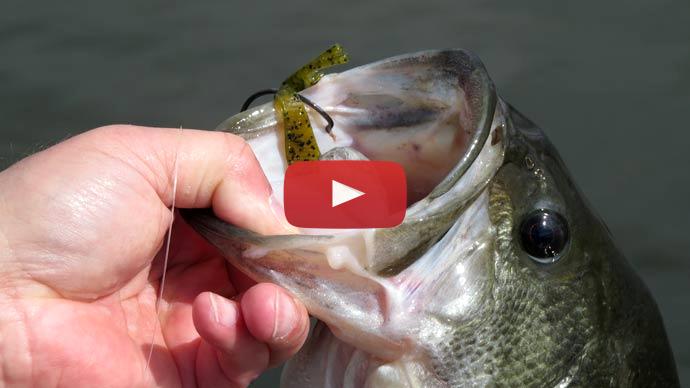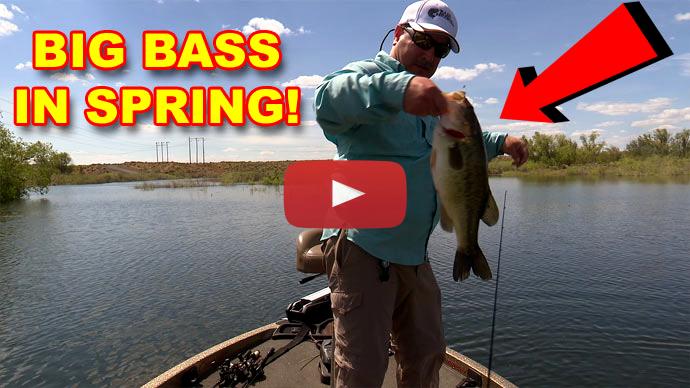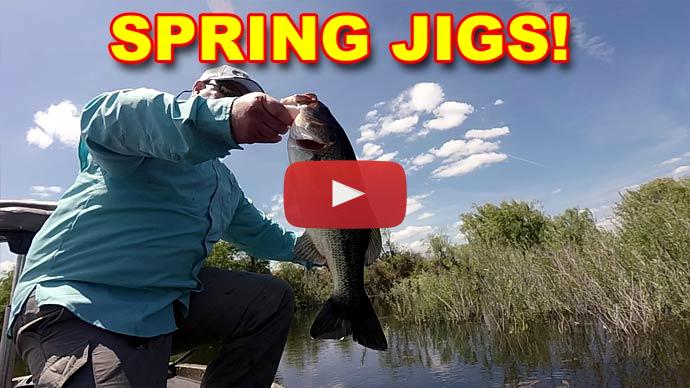Glenn: This is spring fishing, right? I mean, the water’s changing. The water level's change, you get muddy water, clear water, the current is strong one day, its slack the next. Plus you throw a few fronts over the top of it. What kind of advice can you give a guy who's struggling under those conditions trying to catch fish?
Gerald Swindle: I think one thing you always have to remember in the spring is every day's a new day. So if you struggled on Monday, don't let that affect what's going to happen on Tuesday. It's a new day. Fish moved here tonight, fish will move on the moon phase, fish will move according to the wind. So my deal is no matter what happens yesterday, this is not going to influence tomorrow. Go out with a positive attitude. Keep thinking, don't just get in a rut, don't say, "Well, I'm just gonna keep flipping bluffs until I find them." If you hadn't caught them flipping bluffs in two hours, try something new, it's spring time, they're biting somewhere, keep your head in the game and keep moving.
Ott DeFoe: The biggest thing is honestly, just to take every day for itself, I don't know who the quote was. But that said, "Yesterday's history and tomorrow's a mystery." And that is exactly what it is in the spring time, you know, so you need to forget most of what happened yesterday, put it in your memory bank, and don't totally forget about it forever. But don't try to just say, "This worked yesterday, I know it will work tomorrow." Because more times that none all it's going to come back to burn you.
Glenn: So really versatility is the key.
Ott DeFoe: Yeah, versatility and just, you know, being able to change, being able to adapt whether you caught them extremely shallow yesterday, and you need to move out a little bit today or vice versa.
Kevin VanDam: But the biggest thing, you know, when I'm searching for them, I have what I call the 10-minute rule, I don't stay in one spot, doing the same thing for more than 10 minutes without making some kind of adjustment.
And that just keeps you from not burning your day. And, you know, you always got to take into consideration the variables, you know, the current, the water clarity, the time of the year, the weather, you know, all of those things, you want to focus in all those and, and just try to pick a bait that's going to be the most efficient for covering that depth zone, in that set of conditions that you have at the time. And, you know, we all can be guilty of having a favorite lure at times. They're just tools, you got to use the right one to fit the right situation, you know, and that's why we have all these electronics, and that is to help us decipher all those variables around us and come up with a good educated guess.
Glenn: So if they don't know anything about the body of water and had a front come through two nights before, now it's nice, sunny out, like, what would be the first place, what would be the first thing to throw and where to go?
Kevin VanDam: Yeah, well, I've really focused on the seasonal patterns, you know. I mean, that's the foundation of my starting point. And you know, any place you go, you know the general lay of...the type of lake that it is, a river, whatever. And you can at least have somewhat have of an idea of what the seasonal pattern should be. And just, I try to focus on things that fit that seasonal pattern, you know. Right now we're in the pre-spawn stage, typically or late winter, you would call it, water's cold, it's dirty, it's got a lot of color in it. So you know, I'm going to focus on areas that I think the fish are set up to stage to move into actually spawn. So the mouths of creeks or channel swing banks, things like that, areas with some deeper water access, and then experiment and let the fish tell me exactly what stage they're in.
Brandon Palaniuk: I think the biggest thing, the reason that people struggle is their fishing past history. They're not fishing the current conditions. You know, if you go to a body of water that you fish your entire life, and you catch them in this same creek all the time, but you show up and it's blown out mud because it's record rainfalls. And you just try to force it because you say, "Oh, they always live in this creek," well, they might not live in that creek because you have adverse conditions and those fish change. And I think anglers, they don't have an open mind and fish those conditions, as cliché as that sounds, try to say it over and over again to get it in people's heads that you can't just always fish the same areas, you have to fish different areas, in your lake or your river, whatever it may be, based on the conditions that you have, you know. If this body of water would have been normal, a lot of fish would have got caught north of the ramp or upriver of the ramp. But with the current conditions, majority of the field will probably be south of the ramp, because a lot of the upper part of the river is blown out because we've had record rainfall and things like that. And so, those conditions change. And I think that's the biggest thing is just having an open mind and not trying to force the fish into biting, like...
Glenn: Fish the moment.
Brandon Palaniuk: They will tell you what they want. You just can't read the book that we wrote. You got to read the book that they wrote.
Glenn: What kind of advice would you give them?
Edwin Evers: Keep it simple. You know, you don't, it's not, I've always said this and I'm amazed that people don't listen to it. But the wrong bait in the right place will catch them. It's more about finding where the fish are at, you know, put two-three baits on, you got a lot of confidence in and cover some water.
Glenn: It's not all about the perfect bait, the perfect color?
Edwin Evers: For me, it's not.
Glenn: Really?
Edwin Evers: Well, especially when it's this muddy. It's just about putting the bait in front of a bass.
Glenn: Amazing.
Edwin Evers: Pretty profound stuff right there, buddy.
Chris Zaldain: Yeah, you know, the biggest piece of advice I could give you for changing conditions in the springtime on your home body of water is just to be versatile. I again, I grew up in Northern California where I know how to, you know, throw a wacky rigs out in 30 feet of water, or, you know, pitch a giant jig to the bank like we did on the California Delta, but be very versatile because things change so much, that temperature changes, the current changes, the clarity changes. Have yourself a good lineup of rods, power fishing rods, finesse rods all laid out on the deck, and just let the conditions tell you which rod to pick up and when. So be very, very versatile this time of year because the conditions are so up and down, you got to move up and down with them.
Glenn: So this isn't the time of year to go, "I love spinner bait fishing, I'm going to fish a spinner bait all day."
Chris Zaldain: Spinnerbait's a great bait in the springtime and if you were to use one rod in the springtime, I'd probably say spinner bait but if you really, really want to excel and do better than the rest of the guys, just mix it up, keep changing it up and move with the weather, move with the changing conditions.
Keith Poche: You know, it's tough for everybody and even for us, you know, as pro anglers, but you know, just slow down and just fish, you know. Don't move around a whole lot, just slow down and fish because a lot of the time, these fish are real fickle, and they're not really wanting to eat, you know. They're moving around, they're not really focused on feeding, the spawn...or get comfortable, get in comfortable position. So you know, maybe downsize some baits and just really slow down and take your time, and pay attention on where you getting bit and hopefully you can duplicate that. But typically it's just going down the bank and just, you know, maybe seeing something a little bit different than a fish, you know, if there's current or no current, maybe some big stumps out or unique rock point, they're on something, just very unique.
And you know, and it's not really a pattern, a unique pattern. But it's just something different that's down the stretch of that bank. So just keying on those little low key things like that. Going real slow is probably one of the best advice I can give to be successful in this time of year.
Glenn: Power of observation.
Keith Poche: Yeah, 100%. I mean, because you know, there's so much stuff that looks good, that doesn't really have fish on it. And you know, for whatever reason, the fish aren't there. But you really have to back out, slow down and really, you know, take your time and fish through some areas and just, you know, it's just kind of trial and elimination and just figuring out the kind of stuff they're on.
Glenn: Perfect, great advice guys. Pay attention to that.



